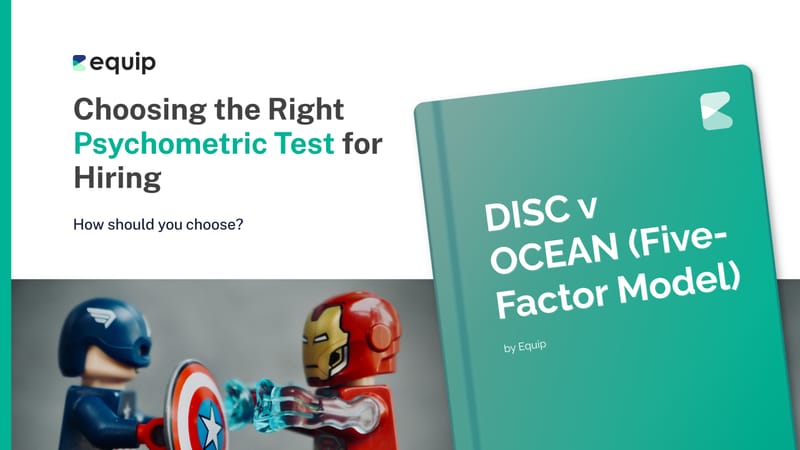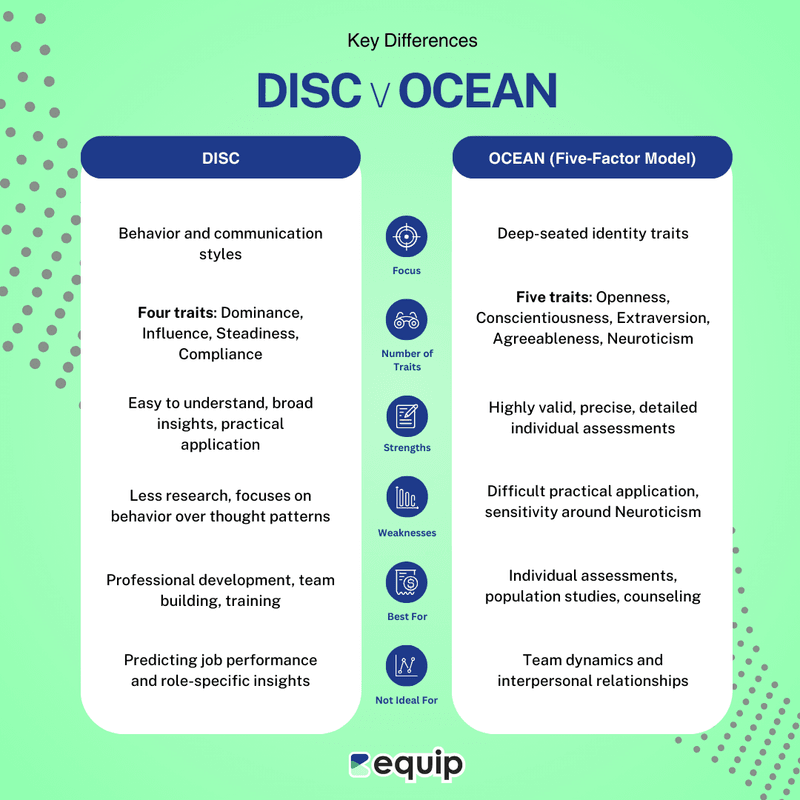
Identity has a noteworthy effect on how individuals handle impediments and work in different circumstances .Thus, identity characteristics have a huge effect on organizational flow, whether it's being calm in the face of trouble or enduring in the interest of responsibilities. According to Psychology Today, around 80% of Fortune 500 companies use personality tests for screening top-level positions. The New York Times highlights the significant investment in personality testing tools.
The OCEAN (Five-Factor) Assessment focuses on an individual's underlying traits, while the DISC Assessment addresses behavior and communication styles. The Five-Factor has five dimensions, and DISC has four. Both provide unique insights valuable for personal development, career planning, team building, and leadership development.
Can DISC and OCEAN Tests Transform Your Hiring Strategy?
Personality assessments like DISC and OCEAN (Five-Factor) are essential tools for recruiters to enhance the hiring process. These assessments aid in:
- Matching Job Requirements: DISC and OCEAN tests identify candidates with the right traits for specific roles. For instance, a high score in Conscientiousness (OCEAN) may indicate a good fit for roles requiring attention to detail, while a high Dominance score (DISC) may be ideal for leadership positions.
- Improving Team Dynamics: By understanding personality profiles, recruiters can build well-balanced teams. DISC profiles can help place individuals in roles where their communication styles enhance team collaboration.
- Reducing Turnover: Retention is reduced when applicants are hired based on how well they fit the job requirements and company culture. For example, knowing a candidate's Neuroticism level (OCEAN) can help predict their ability to handle job stress, ensuring long-term job satisfaction.
- Enhancing Leadership Development: Identifying potential leaders through traits like Influence (DISC) or Extraversion (OCEAN) helps in tailoring leadership development programs.
But you should weigh the pros and cons of a psychometric test before implementing it.
Looking for a sample test? Try the free psychometric demo test on Equip.
What is the DISC Assessment?
The DISC assessment, based on the work of psychologist William Moulton Marston, categorizes behavior into four main traits: Dominance, Influence, Steadiness, and Compliance.
Applications of DISC
- Professional Development: DISC helps individuals understand their behavior and communication styles, aiding in personal growth and development.
- Team Building: By understanding team members' DISC profiles, teams can improve collaboration and communication.
- Leadership Development: Leaders can use DISC to adapt their management style to better motivate and support their teams.
For details, read: Can DISC Assessments Really Help Us Understand People Better?
What is the OCEAN (Five-Factor) Assessment?
The Five-Factor Personality Traits (OCEAN) defines five broad dimensions: Openness, Conscientiousness, Extraversion, Agreeableness, and Neuroticism. These traits are stable over time and supported by extensive research.
Applications of the Five-Factor Model of Personality
- Individual Assessments: Provides detailed insights into an individual's personality, useful for personal development and counseling.
- Population Studies: Effective for large-scale studies of personality traits across different demographics.
- Career Planning: Helps individuals understand their strengths and areas for improvement, guiding career choices.
To know more: How HR can use Big Five Personality (OCEAN) tests for hiring
Key Differences: DISC vs. OCEAN (Five-Factor)
Feature | DISC | OCEAN (Big 5 Personality Test) |
|---|---|---|
Focus | Behavior and communication styles | Deep-seated identity traits |
Number of Traits | Four: Dominance, Influence, Steadiness, Compliance | Five: Openness, Conscientiousness, Extraversion, Agreeableness, Neuroticism |
Strengths | Easy to understand, broad insights, practical application | Highly valid, precise, detailed individual assessments |
Weaknesses | Less research, focuses on behavior over thought patterns | Difficult practical application, sensitivity around Neuroticism |
Best For | Professional development, team building, training | Individual assessments, population studies, counseling |
Not Ideal For | Predicting job performance and role-specific insights | Team dynamics and interpersonal relationships |
Now, let’s dig deeper!
Practical Uses of DISC and OCEAN tests
DISC in Action
- Example 1: A marketing team at a large corporation can use DISC profiles to improve collaboration. Knowing each team member's preferred communication style allows to customize their interactions, which raises morale and output.
- Example 2: A startup can use DISC to identify leadership potential among employees. Those with high Dominance and Influence traits may be suitable for leadership training programs.
OCEAN (Five-Factor) in Action
- Example 1: A tech company can conduct Five-Factor assessments to identify employees suitable for remote work. High scores in Conscientiousness and low scores in Neuroticism would indicate individuals who are disciplined with an ability to handle remote work stress effectively.
- Example 2: An educational institution can use Five-Factor assessments to tailor professional development programs for teachers. By understanding their Openness and Extraversion scores, the institution could offer personalized training that enhanced teaching effectiveness and job satisfaction.
DISC vs. OCEAN (Five-Factor): A Head-to-Head Comparison
Feature | DISC | OCEAN (Five-Factor) |
|---|---|---|
Situational vs. Trait Focus | Emphasizes behavior and situational responses. Ideal for understanding how individuals interact in specific settings, such as teams or client-facing roles. | Focuses on deep-seated personality traits. Useful for long-term career planning and personal development. |
Ease of Interpretation | Simple, visual representation makes it easy for teams to understand and apply when needed. | Detailed numerical scores provide precise insights but can be complex to interpret without professional guidance. |
Research and Validation | Although practical and widely used, it has less extensive research compared to the OCEAN (Five-Factor). | Supported by decades of psychological research, making it highly reliable for scientific and professional use. |
Both the OCEAN (Five-Factor) and DISC assessments propose valuable insights into personality, each with its fortes. Recruiters should choose their tests based on specific needs. For individual analysis, the Five-Factor is ideal. For professional and team settings, DISC offers practical, actionable insights.
Summary

Continue reading: Tips to Conduct Psychometric Tests
